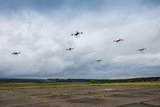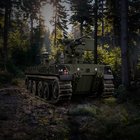Global Hawk program prepares for major evaluation
Beale's RQ-4 Global Hawk program is set to undergo an Initial Operation Test and Evaluation in October 2010 in support of an exercise, conducted by Air Force Operational Test and Evaluation Center, to check the capabilities of the aircraft and its sensors.
The six-week evaluation will include 17 flight sorties from Beale and Edwards Air Force Base, Calif., and will range from eight to 28 hour missions.
The IOT&E is used to determine if an aircraft meets the needs of the Air Force. In the Global Hawk's case, the evaluation will determine the operational capabilities of the plane and test for any malfunctions or mishaps in the aircraft systems.
According to Maj. Rob Gudikunst, 9th Reconnaissance Wing's IOT&E project officer & RQ-4 instructor pilot, the Global Hawk will be evaluated by AFOTEC in numerous areas to include system suitability, mission planning, mission execution, collection of images, signals intelligence and processing the imagery from the systems.
"It's everything from pre-launch of the aircraft, to what's done with the products at the end," Major Gudikunst said.
AFOTEC inspectors will be looking at a representative sample of the new 'B' model Global Hawks.
"Beale wants to focus exclusively on the B model aircraft and its capabilities," Major Gudikunst said. "This evaluation is but one important step towards the eventual employment of the B model worldwide."
The major said the 'B' model aircraft is a larger aircraft which carries a 3,000 pound payload in its sensor package which is 50 percent greater than the 'A' model. Because of this, he said the 'B' model is much more capable than the 'A' model.
Beale has been receiving Block 30 aircraft for several months and with the arrival of the latest platform, it has allowed pilots, sensor operators and maintainers to gain valuable experience in preparation for the evaluation.
"We've had a lot of good experience on the 'B' model and we've been allowed to test our network with this aircraft," the major said. "There were some issues like with any new aircraft coming out and we've experienced some problems and we've overcome them and it has aided us to ensure we go into IOT&E ready to go."
Major Gudikunst said some problems are expected during the evaluation but what the team is looking for is major problems that would affect Beale's ability to employ the aircraft. Any major findings could delay full operational employment however Major Gudikunst is confident in the abilities of the people working and flying the Global Hawk.
"We were learning a lot on the fly with the 'A' model aircraft," he said. "We learned how to use everything [Northrop Grumman] gave us and learn to make them better. We've done a very good job on finding what needs to be fixed and having success in applying it to the 'B' model that will be looked at during IOT&E this fall."
Most of the flights for the IOT&E will be flown out of Beale however one aircraft will fly four sorties from Edwards to test specific sensor capabilities.
During the evaluation flights, Global Hawks will capture images of targets en-route to destinations in Alaska, California and Florida. Major Gudikunst said this wide spectrum will show the full range of capabilities for the RQ-4 and will test the system to the fullest.
Many people involved with the program are confident headed into the evaluation.
Major Gudikunst said the men and women at Beale have worked hard in preparation and are ready to fly these test sorties to demonstrate the capabilities of the RQ-4.
by Senior Airman Chuck Broadway - 9th RW Public Affairs
More from Uncrewed Vehicles
-
![US Navy foresees an uncrewed future for its surface and underwater fleet]()
US Navy foresees an uncrewed future for its surface and underwater fleet
The service has been conducting various procurement and development efforts to integrate unmanned surface and underwater vehicles into its inventory.
-
![Ready for the race: Air separation drone swarms vs. air defence systems]()
Ready for the race: Air separation drone swarms vs. air defence systems
As the dynamics of aerial combat rapidly evolve, Chinese scientists have engineered a sophisticated air separation drone model that can fragment into up to six drones, each capable of executing distinct battlefield roles and challenging the efficacy of current anti-drone defences such as the UK’s Dragonfire laser system.
-
![Israel’s MALE UAVs ‘must adapt’ to Iranian-made air defences]()
Israel’s MALE UAVs ‘must adapt’ to Iranian-made air defences
Advancements in air defence technologies have begun to reshape aerial combat dynamics in the Middle East, as illustrated by recent events involving the Israeli Air Force and Hezbollah.
-
![Hundreds more UAS sent to Ukraine forces with thousands more on the way]()
Hundreds more UAS sent to Ukraine forces with thousands more on the way
Both sides of the Russia-Ukraine war have been using UAS for effective low-cost attacks, as well as impactful web and social media footage. Thousands more have now been committed to Ukrainian forces.
-
![AI and software companies selected for US Army Robotic Combat Vehicle subsystems]()
AI and software companies selected for US Army Robotic Combat Vehicle subsystems
The US Army has intentions to develop light, medium and heavy variants of the Robotic Combat Vehicle (RCV) as part of the branche’s Next Generation Combat Vehicle family.

























